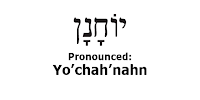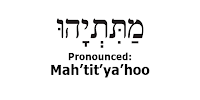John
(Are you looking for our Twebrew School Treats about the Hebrew alphabet or our Hebrew Instructional videos? Click here for a directory!) Click here to hear Yo’chah’nahn pronounced
Click here to hear Yo’chah’nahn pronounced
The name John is actually the Greek rendition of the Hebrew name Yochanan (Johanan - a name that today many would assume is German). While the common name John gets its popularity from John the Baptist, Yochanan was actually a common name in early Jewish history. The name translates to “God is gracious.”
There are two different Yochanans mentioned in the biblical canon. The first is Yochanan ben Karea, who tried to warn Gedaliah, the Babylonian-appointed governor of Judah, that he was going to be assassinated, After the assassination occurred and Babylonian troops appeared to express the emperors ire, Yochanan ben Korea helped lead the remaining inhabitants of Judea to safety in Egypt (Jeremiah 43:8-22).
The second appearance of this name is in the Book of Nechemia. Yochanan ben Yayada is listed as one of the priests who returned from Babylon with Zerubabbel.
There are, however, several important post-biblical Yochanans. While everyone remembers Judah Macabee, who led the rebellion, his oldest brother was the less well-known Yochanan Gaddi (note the Greek second name). His death at the hands of the sons of Jambri from Medeba (in Moab, now Jordan) is recorded in the first Book of Maccabees.
Within the same family, but several generations later, the name Yochanan reappears. Yochanan Girhan assumed the Hasmonean kingship in 134 B.C.E., and was known as John Hyrcanus I. By the time his descendant, John Hyrcanus II, became High Priest in 76 B.C.E., the Hebrew Yochanan appears to have fully transformed to the Greek John.
When Jewish life moved into the age of written oral tradition, Yochanan remained a popular name. Rabbi Yochanan ben Zakkai was the Jewish leader who lived through the destruction of the Temple. He remained loyal and devoted to the Jewish people, and when the Emperor Vespasian offered him three wishes, one of them was that Vespasian give the Jews the city of Yavneh, which was to become the new home of the Sanhedrin, and spare the sages from destruction.
Finally, in our list of famous Yochanans, was the fascinating, and incredibly handsome, Rabbi Yochanan ben Naf'cha, was a well-known student of Rabbi Judah the Prince (Yehuda Hanasi) Rabbi Judah the Prince (Yehuda Hanasi), the redactor of the Mishna. Among other things, Rabbi Yochanan ben Naf'cha is credited with editing the Jerusalem Talmud.
Copyright © 2011 National Jewish Outreach Program. All rights reserved.
 Click here to hear Yo’chah’nahn pronounced
Click here to hear Yo’chah’nahn pronounced The name John is actually the Greek rendition of the Hebrew name Yochanan (Johanan - a name that today many would assume is German). While the common name John gets its popularity from John the Baptist, Yochanan was actually a common name in early Jewish history. The name translates to “God is gracious.”
There are two different Yochanans mentioned in the biblical canon. The first is Yochanan ben Karea, who tried to warn Gedaliah, the Babylonian-appointed governor of Judah, that he was going to be assassinated, After the assassination occurred and Babylonian troops appeared to express the emperors ire, Yochanan ben Korea helped lead the remaining inhabitants of Judea to safety in Egypt (Jeremiah 43:8-22).
The second appearance of this name is in the Book of Nechemia. Yochanan ben Yayada is listed as one of the priests who returned from Babylon with Zerubabbel.
There are, however, several important post-biblical Yochanans. While everyone remembers Judah Macabee, who led the rebellion, his oldest brother was the less well-known Yochanan Gaddi (note the Greek second name). His death at the hands of the sons of Jambri from Medeba (in Moab, now Jordan) is recorded in the first Book of Maccabees.
Within the same family, but several generations later, the name Yochanan reappears. Yochanan Girhan assumed the Hasmonean kingship in 134 B.C.E., and was known as John Hyrcanus I. By the time his descendant, John Hyrcanus II, became High Priest in 76 B.C.E., the Hebrew Yochanan appears to have fully transformed to the Greek John.
When Jewish life moved into the age of written oral tradition, Yochanan remained a popular name. Rabbi Yochanan ben Zakkai was the Jewish leader who lived through the destruction of the Temple. He remained loyal and devoted to the Jewish people, and when the Emperor Vespasian offered him three wishes, one of them was that Vespasian give the Jews the city of Yavneh, which was to become the new home of the Sanhedrin, and spare the sages from destruction.
Finally, in our list of famous Yochanans, was the fascinating, and incredibly handsome, Rabbi Yochanan ben Naf'cha, was a well-known student of Rabbi Judah the Prince (Yehuda Hanasi) Rabbi Judah the Prince (Yehuda Hanasi), the redactor of the Mishna. Among other things, Rabbi Yochanan ben Naf'cha is credited with editing the Jerusalem Talmud.
Copyright © 2011 National Jewish Outreach Program. All rights reserved.

Comments
Post a Comment